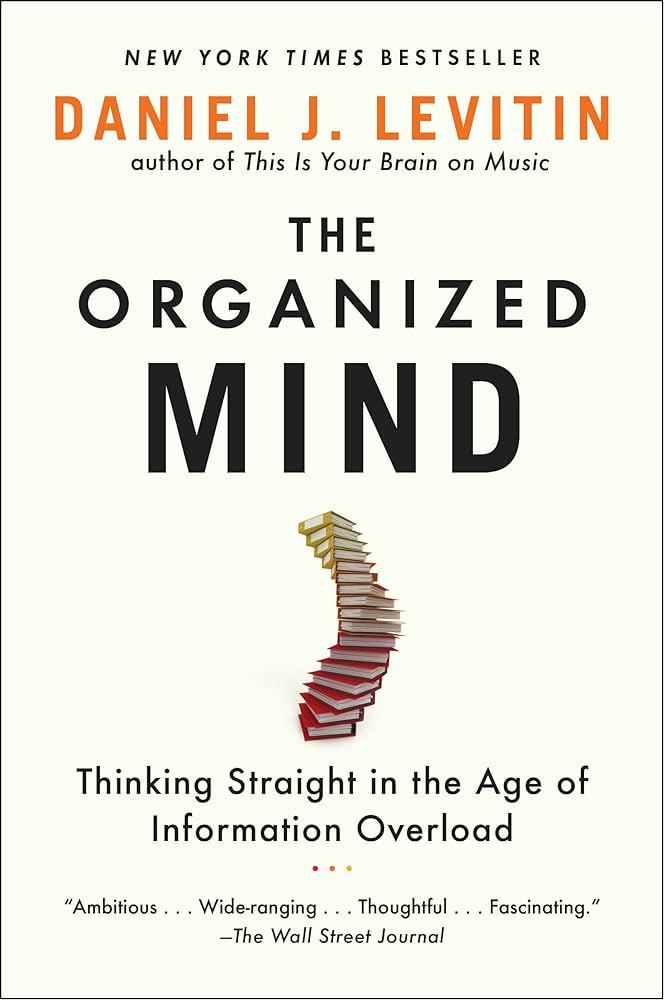The Organized Mind applies brain science to improve how we manage information. Given that our brain’s evolution has not caught up with the recent exponential growth in the data we encounter, we need techniques to adapt. One way make optimal decisions and sustain happiness is to practice satisficing (a combination of satisfying and sufficient). People who satisfice regularly know when additional thought won’t yield meaningful benefits and move on to the next thing. Satisficing is not for your highest priority item, but rather creates the space for it by expediting the time and thought spent on everything else.
While our brains have ample storage, we have a limited ability to retrieve memories. The best way to free your mind of this burden is to write down key information in an external system. We do this naturally with calendars, to-do lists, notes, etc., but it’s helpful to routinely reflect on what we keep in our head and store more externally.
Daniel introduces an important and counterintuitive concept to organization: the junk drawer. While it’s important to organize major areas of your work, life, and physical possessions, there will always be less important items that don’t fit neatly into a predefined category. Consciously using a junk drawer or “other” folder most efficiently organizes these items because it removes the fruitless categorization task.
This book has helped me optimize how I organize information and what I choose to focus on.
You should read this book if you…
- want to understand the limits of your brain and how to optimize around them
- seek understanding of how various activities (sleep, exercise, etc.) affect brain health
- want better techniques to organize your life
Additional Information
Year Published: 2014
Book Ranking (from 1-10): 8 – Very Good – In depth insights on a specific topic
Ease of Read (from 1-5): 3 – Average
Key Highlights
- Memory is fallible, of course, but not because of storage limitations so much as retrieval limitations
- Companies are like expanded brains, with individual workers functioning something like neurons. Companies tend to be collections of individuals united to a common set of goals, with each worker performing a specialized function
- Satisficing is one of the foundations of productive human behavior; it prevails when we don’t waste time on decisions that don’t matter, or more accurately, when we don’t waste time trying to find improvements that are not going to make a significant difference in our happiness or satisfaction
- These highly successful persons—let’s call them HSPs—have many of the daily distractions of life handled for them, allowing them to devote all of their attention to whatever is immediately before them. They seem to live completely in the moment. Their staff handle correspondence, make appointments, interrupt those appointments when a more important one is waiting, and help to plan their days for maximum efficiency (including naps!)
- The most fundamental principle of the organized mind, the one most critical to keeping us from forgetting or losing things, is to shift the burden of organizing from our brains to the external world. If we can remove some or all of the process from our brains and put it out into the physical world, we are less likely to make mistakes. This is not because of the limited capacity of our brains—rather, it’s because of the nature of memory storage and retrieval in our brains
- Neurons are living cells, and they can connect to one another in trillions of different ways. These connections don’t just lead to learning—the connections are the learning
- Pirsig recognized that some of the best ideas you’ll have will come to you when you’re doing something completely unrelated. You don’t have time to figure out how to use the idea because you’re busy with something else, and taking time to contemplate all the angles and ramifications takes you out of the task you’re working on. For Phaedrus, an unassimilated pile helped solve the problem. “He just stuck the slips there on hold until he had the time and desire to get to them.” In other words, this is the junk drawer, a place for things that don’t have another place
- The task of organizational systems is to provide maximum information with the least cognitive effort
- There is perhaps an illusion in all of this. Social networking provides breadth but rarely depth, and in-person contact is what we crave, even if online contact seems to take away some of that craving. In the end, the online interaction works best as a supplement, not a replacement for in-person contact. The cost of all of our electronic connectedness appears to be that it limits our biological capacity to connect with other people
- Creative solutions often arise from allowing a sequence of altercations between dedicated focus and daydreaming
- A night of sleep more than doubles the likelihood that you’ll solve a problem requiring insight
- The emerging consensus is that sleep is not an all-or-nothing state. When we are tired, parts of our brain may be awake while other parts sleep, creating a kind of paradoxical mental state in which we think we’re awake, but core neural circuits are off-line, dozing. One of the first neural clusters to go off-line in cases like these is memory, so even though you think you’re awake, your memory system isn’t. This causes failures of retrieval (what was that word again?) and failures of storage (I know you just introduced yourself, but I forgot what you said your name is)
- Life Time As people grow older, they frequently say that time seems to pass more quickly than when they were younger. There are several hypotheses about this. One is that our perception of time is nonlinear and is based on the amount of time we’ve already lived. A year in the life of a four-year-old represents a larger proportion of the time she’s already been alive than it does for a forty-year-old. Experiments suggest that the formula for calculating subjective time is a power function, and the equation states that the passing of a year should seem twice as long for a ten-year-old than for a forty-year-old. You may recall trying to be still for an entire minute as a child, and now a minute goes by very quickly
- Successful managers understand that they cannot provide guidance or direction for all conceivable contingencies. Having communicated a clear and concise expression of their intent, they then convey the boundaries within which subordinates may exercise disciplined initiative while maintaining unity of effort. Disciplined initiative is defined as taking action in the absence of specific instructions when existing instructions no longer fit the situation, or unforeseen opportunities arise
- Why do psychiatrists work a fifty-minute hour? They use that extra ten minutes to write down what happened. Rather than scheduling meetings back-to-back, experts advise giving yourself ten minutes to write down what happened, to make notes about what needs to be done, and other comments that will orient you to this project when you next start to work on it

Discover more from The Broader Application
Subscribe to get the latest posts sent to your email.
